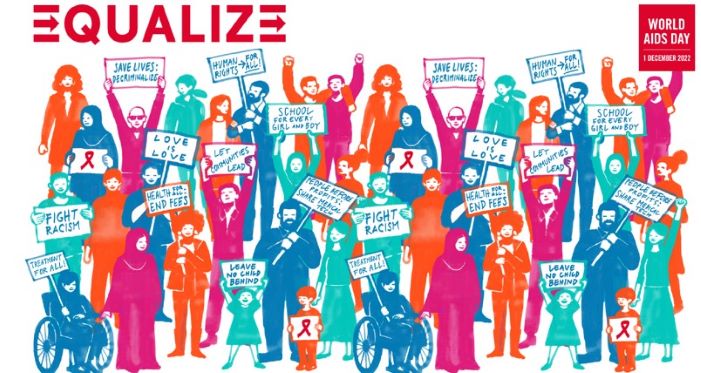Basseterre, St. Kitts, December 5, 2022 (SKNIS): On December 1, the World observed the 34th World AIDS Day since the United Nations instituted the commemorative day in 1988 to raise awareness of the AIDS pandemic caused by the spread of HIV infection, to mourn those who have died from an AIDS-related illness, and to provide the opportunity for all of us to join in the fight against the disease.
The theme for this year’s World AIDS Day is “Equalize”, and the WHO (World Health Organization) is calling on global leaders and citizens to boldly recognize and address the inequalities which are holding back progress in ending AIDS; and equalize access to essential HIV services, particularly for children and key populations and their partners – men who have sex with men, transgender people, people who use drugs, sex workers, and people in prisons.
National HIV/AIDS Coordinator in the Ministry of Health in St. Kitts, Dr. Matthias Ofre, said that the word “equalize” is a call to action for all of us to join in eradicating HIV/AIDS.
“It’s an action word. It calls for action. It calls for the activity of everyone to focus on a better, proper quality fight in eradicating the virus HIV itself. So, it showcases that everybody is important in ensuring the fight against the virus—one person can’t do it; one sector can’t do it, and I feel that it is a holistic approach, a multi-sectoral approach in fighting this virus. This is the only way that we can really overcome it, combat it and be successful,” said Dr. Ofre in an interview with the St. Kitts and Nevis Information Service on November 24.
HIV/AIDS Health Educator/Counsellor in the Ministry of Health, Lucine Pemberton-Vaughn said that stigma and discrimination towards persons living with HIV/AIDS and key populations such as the LGBTQ+ community are contradicting what it means to “equalize”.
“HIV/AIDS is everybody’s business because I am of the firm belief that we are all vulnerable to it, even babies are born with HIV…once you are engaging in certain activities you are at risk, even the married and it behooves us to make it our business and do what we can to eradicate it,” Pemberton-Vaughn said.
She said that stigma and discrimination against the LGBTQ+ community are posing a problem in society vis-à-vis eradicating the virus.
“These persons tend to be shamed, be blamed, be shunned. We talk about them. We point them out and they are treated differently even at some of our healthcare institutions, so these persons shy away from testing; they are afraid to come forward and admit to their partners about their status. Some even have meds and are afraid to take them lest people realize that they are HIV positive, and you can see what that does, it sends them underground, and it’s underground that they are now able to replicate and transmit…we should be able to accept everybody knowing that we are all equals and that at the heart of stigma and discrimination is the violation of human rights. We are equals; we are free to express ourselves and we have the right to access care and services like anybody else. It behooves us to be a more accepting community,” she said.
Dr. Ofre on the other hand said that equality has to do with two aspects: one, increasing the availability of quality and sustainable services to not just a group of persons but ensuring that everybody is well served, and two, reforming the laws and policies that could fight against inequality and to ensure that everybody is viewed as a person and everybody has the assets and the ability to access healthcare and feel free enough to access healthcare.
“We need to see ourselves as equals in fighting this necessary fight against this unwanted virus that is plaguing the nation and also the world at large,” he said.
As of 2021, 38.4 million people live with HIV—1.7 million of these are children.
Based on data from the Ministry of Health, there are 217 persons living with HIV in St. Kitts and Nevis as of November, 2022.
-30-









